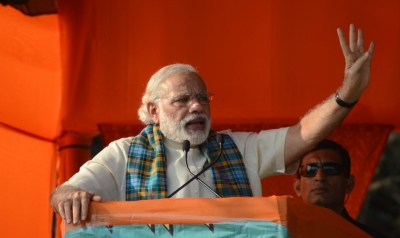New Delhi, April 9 (IANS) Prime Minister Narendra Modi said on Tuesday that the people want freedom from “political families” who have been “milking” the Kashmir issue and the situation in Valley is such that people want change, whether it is about Article 370 or Article 35A.
In an interview to CNN-News18, the Prime Minister also said that the provisions of the Articles 370 and 35A, which provide special rights and privileges to its permanent citizens and also gives autonomous status to Jammu and Kashmir, were an obstacle in the way of outside investment and job creation in the state.
“The problem in Kashmir is largely due to 50-odd political families there. They have been milking the issue. They don’t want any benefit to be given to ordinary Kashmiris,” he said.
“People want freedom from such political families who have been preying on their emotions for 50 years. The situation in Kashmir is such that people want change, whether it is about Article 35A or 370,” he added.
Reiterating BJP’s stand on revoking Article 370 and 35A, the Prime Minister said Kashmiri political families had “used public sentiment for political gains”.
“The provisions were an obstacle in the way of outside investment and job creation in the state,” he said.
The Prime Minister’s remarks come a day after the BJP in its election manifesto for the Lok Sabha polls pledged abrogation of Article 370 and 35A, vehemantly opposed by political parties in Jammu and Kashmir.
National Conference (NC) leader Farooq Abdullah had warned the Centre to refrain from pushing abrogation of Article 370 and said that such an act would “pave the way for Azadi for Kashmiri people” while Peoples Democratic Party (PDP) President Mehbooba Mufti said that abrogating Article 370 would lead to Jammu and Kashmir’s “freedom” from India.
Looking to counter the perception that the situation in Kashmir has worsened over the last five years, Modi said there was more violence during the panchayat elections in West Bengal than the one held in Jammu and Kashmir recently.
“West Bengal saw violence during panchayat polls but in Jammu and Kashmir there was zero violence during the panchayat polls. This is something the media overlooks. Even unbiased media ends up fuelling the Kashmir narrative by its continuous coverage of terror attacks. But they must also show the progress and the growth of the Kashmiri people,” he said.
Terming the Bharatiya Janata Party’s alliance with PDP an “experiment”, he said the coalition government in the state ran its course when Mehbooba Mufti kept delaying panchayat elections in the state.
“When she asked for our support, we gave it. But when it came to panchayat election, she kept delaying, saying it would spark violence in the region,” Modi said, adding the strains in the coalition began when his father Mufti Mohammad Sayeed passed away.
“It was working well during Mufti sahab’s time. When Mehbooba ji came, she was very reluctant. She did not step forward for two-three months which led to Governor’s rule in the state,” he said.
Later, the BJP supported Mufti, but after three years of coalition government, the saffron party pulled out of the alliance in June 2018, leading to Mufti’s resignation as Chief Minister and imposition of Governor’s rule in the state.
Modi said the BJP had hoped that regional parties PDP and the NC would come together and form a government after 2014 Assembly election in the state.
The PDP had then emerged as the single-largest party, but had failed to cross the majority mark.
“The alliance with the PDP was an experiment. The Kashmir mandate was a fractured one. No single party could have formed the government. We waited for a long time in the hope that the PDP and NC would ally, but they could not see eye-to-eye,” Modi said.
The Prime Minister said the BJP decided to side with the PDP to uphold the democratic option of forming a government in the state.
“After two-three months, we started talks with Mufti sahab, who was a senior leader. We had always maintained that our ideologies do not match, but we came forward to shoulder the responsibility. We thought we would attempt an experiment,” he said.
–IANS
bns/prs

